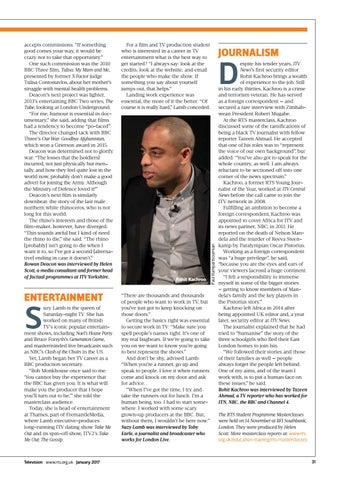For a film and TV production student who is interested in a career in TV entertainment what is the best way to get started? “I always say: look at the credits; look at the website; and email the people who make the show. If something you say about yourself jumps out, that helps.” Landing work experience was essential, the more of it the better. “Of course it is really hard,” Lamb conceded.
ENTERTAINMENT
“There are thousands and thousands of people who want to work in TV, but you’ve just got to keep knocking on those doors.” Getting the basics right was essential to secure work in TV: “Make sure you spell people’s names right. It’s one of my real bugbears. If we’re going to take you on we want to know you’re going to best represent the shows.” And don’t be shy, advised Lamb: “When you’re a runner, go up and speak to people. I love it when runners come and knock on my door and ask for advice. “When I’ve got the time, I try and take the runners out for lunch. I’m a human being, too. I had to start somewhere. I worked with some scary grown-up producers at the BBC. But, without them, I wouldn’t be here now.” Suzy Lamb was interviewed by Toby Earle, a journalist and broadcaster who works for London Live.
S
uzy Lamb is the queen of Saturday-night TV. She has worked on many of British TV’s iconic popular entertainment shows, including Noel’s House Party and Bruce Forsyth’s Generation Game, and masterminded live broadcasts such as NBC’s Clash of the Choirs in the US. Yet, Lamb began her TV career as a BBC production secretary. “Bob Monkhouse once said to me: ‘You cannot buy the experience that the BBC has given you. It is what will make you the producer that I hope you’ll turn out to be,’” she told the masterclass audience. Today, she is head of entertainment at Thames, part of FremantleMedia, where Lamb executive-produces long-running ITV dating show Take Me Out and its spin-off show, ITV2’s Take Me Out: The Gossip.
Television www.rts.org.uk January 2017
Rohit Kachroo
JOURNALISM
D
Paul Hampartsoumian
accepts commissions: “If something good comes your way, it would be crazy not to take that opportunity.” One such commission was the 2010 BBC Three film, Tulisa: My Mum and Me, presented by former X Factor judge Tulisa Contostavlos, about her mother’s struggle with mental health problems. Deacon’s next project was lighter, 2013’s entertaining BBC Two series, The Tube, looking at London Underground. “For me, humour is essential in documentary,” she said, adding that films had a tendency to become “po-faced”. The director changed tack with BBC Three’s Our War: Goodbye Afghanistan, which won a Grierson award in 2015. Deacon was determined not to glorify war: “The losses that the [soldiers] incurred, not just physically but mentally, and how they feel quite lost in the world now, probably don’t make a good advert for joining the Army. Although the Ministry of Defence loved it!” Deacon’s next film is similarly downbeat: the story of the last male northern white rhinoceros, who is not long for this world. The rhino’s interests and those of the film-maker, however, have diverged: “This sounds awful but I kind of need the rhino to die,” she said. “The rhino [probably] isn’t going to die when I want it to, so I’ve got a second [alternative] ending in case it doesn’t.” Rowan Deacon was interviewed by Helen Scott, a media consultant and former head of factual programmes at ITV Yorkshire.
espite his tender years, ITV News’s first security editor Rohit Kachroo brings a wealth of experience to the job. Still in his early thirties, Kachroo is a crime and terrorism veteran. He has served as a foreign correspondent – and secured a rare interview with Zimbab wean President Robert Mugabe. At the RTS masterclass, Kachroo discussed some of the ramifications of being a black TV journalist with fellow reporter Tazeen Ahmad. He accepted that one of his roles was to “represent the voice of our own background”, but added: “You’ve also got to speak for the whole country, as well. I am always reluctant to be sectioned off into one corner of the news spectrum.” Kachroo, a former RTS Young Journalist of the Year, worked at ITV Central News before the call came to join the ITV network in 2008. Fulfilling an ambition to become a foreign correspondent, Kachroo was appointed to cover Africa for ITV and its news partner, NBC, in 2011. He reported on the death of Nelson Mandela and the murder of Reeva Steenkamp by Paralympian Oscar Pistorius. Working as a foreign correspondent was “a huge privilege”, he said, “because you are the eyes and ears of your viewers [across] a huge continent. “I felt a responsibility to immerse myself in some of the bigger stories – getting to know members of Man dela’s family and the key players in the Pistorius story.” Kachroo left Africa in 2014 after being appointed UK editor and, a year later, security editor at ITV News. The journalist explained that he had tried to “humanise” the story of the three schoolgirls who fled their East London homes to join Isis. “We followed their stories and those of their families as well – people always forget the people left behind. One of my aims, and of the team I work with, is to put a human face on these issues,” he said. Rohit Kachroo was interviewed by Tazeen Ahmad, a TV reporter who has worked for ITN, NBC, the BBC and Channel 4. The RTS Student Programme Masterclasses were held on 14 November at BFI Southbank, London. They were produced by Helen Scott. More masterclass reports at: www.rts. org.uk/education-training/rts-masterclasses
31
